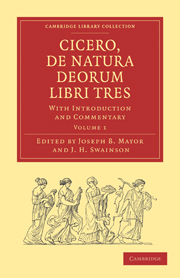Commentary on Book I
Published online by Cambridge University Press: 29 August 2010
Summary
INTRODUCTION. I. i—vii. 17
Dedication to Brutus. The importance and difficulty of the subject; variety of opinions; some asserting the existence of the gods, some doubting, some denying it. Those who believe in their existence differ as to their nature; the Epicureans denying that they pay any regard to human affairs, the Stoics affirming that the universe is ordered by them for the good of man, while the Academy holds that man has no right to dogmatise, and confines itself to the criticism of the other schools. §§ 1—5.
Cum sint—tum est. Heindorf with some of the less important MSS reads sunt, ‘sermonis legi convenienter’; but both constructions are allowable, see Madv. Fin. I 19, Roby Gr. §§ 1734, 1735. The Ind. which is found in the very similar passage Divin. I 7 cum omnibus in rebus temeritas turpis est, turn in eo loco maxime which concerns religion, is more naturally used in comparing particular cases (‘as—so’ ‘both—and’); the Subj. views the particular case in relation to the general principle, as in Off. iii 5 cum tota philosophia frugifera sit, turn nullus feracior in ea locus est quam de officiis, and Lael. 23 with Seyffert's note. Translate, ‘while there are many questions in philosophy which are far from having been fully cleared up, there is one of special difficulty, I mean the inquiry into the nature of the gods’.
- Type
- Chapter
- Information
- Cicero, De Natura Deorum Libri TresWith Introduction and Commentary, pp. 65 - 228Publisher: Cambridge University PressPrint publication year: 2010



